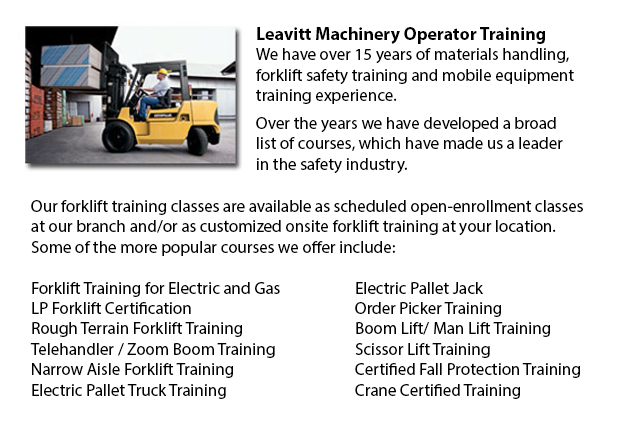
Forklift Certification Schools Seattle - In North America, forklift certification is mandatory, making forklift training programs essential for both the company and their workers working as forklift operators. Forklift training focuses on safety and health issues involved in forklift use. Safety concerns affect both the driver of the forklift and personnel and other people who are in close proximity to the forklift. Businesses could be subject to penalties if they are caught with operators who are un-certified during an inspection. There are a lot of convincing reasons why businesses should abide by forklift standards.
Nearly all provincial, federal and state rules require an employee evaluation of the skills needed for forklift safety before the employer signs off that the employee is certified. There are several ways to get forklift training for workers, such as online forklift training. Nevertheless, employers have to be aware that forklift certification training is not "just a test". Correct forklift training must include some fields of study, like for instance theory and hands-on practice. Regulations do not require employers to have an outside organization to certify forklift operators.
A quality forklift certification school would include a recommended curriculum which comprises classroom training and hands-on training that is performed on-site. The training sessions in the classroom incorporate power point presentations, videos, models and discussions. Students normally must write a test to check for subject matter comprehension. Certificates of completion are given upon successfully finishing the class.
An evaluation of the student's use of the equipment consists of knowledge of job site hazards, pre-operational equipment inspection, operational instruction and a pass/fail operational test.
Training typically covers the following subject areas: Controls & Instrumentations; Understanding legislations and regulations; Engine Operation and Maintenance; maneuvering and Steering; Fork and Attachment Restrictions, Visibility; Stability, Rated Capacities, Inspection & Maintenance; Load Manipulation; Refueling; Pedestrians, and Dangerous Locations & Rough Terrain Operation. There are even training courses offered for workers who are transitioning to new job positions.
-
Wheel Loader Operator Training Seattle
Wheel Loader Operator Training Seattle - Cranes are industrial equipment that make use of pulleys or levers to be able to pick up significant weights. The Roman people utilized cranes so as to put up large monuments, meaning these equipment have been... More -
Aerial Lift Certification Seattle
Aerial Lift Certification Seattle - Aerial Lift Certification is for people who requires an in-depth understanding of aerial lift safety. Operators and inspectors, construction craftsmen, supervisors and maintenance workers must perform a training an... More -
Certified Fall Protection Training in Seattle
Regrettably, there is a large number of workplace injuries connected to falling and a high volume of fall-related deaths reported every year. A lot of these instances might have been avoided by having proper measures in place, offering right training... More -
Warehouse Forklift Training Programs Seattle
Warehouse Forklift Training Programs Seattle - Warehouses can be industrial, commercial or retail facilities. Their function can differ from retailing bulk products to product distribution. Regardless of the type of warehouse, workers within warehous... More -
Boom Lift Certification Seattle
Boom Lift Certification Seattle - Elevated work platforms allow maintenance operations and work to be done at levels that can not be reached by any other method. Boom Lift Certification Training teaches workers regarding the safe operation of boom li... More -
Telehandler Training Courses Seattle
Telehandler Training Courses Seattle - The employer has the responsibility to make sure that their staff are trained to work competently utilizing telehandler machines. The personnel should be assessed for their ability to utilize the machine. If def... More -
Heavy Equipment Safety Training Seattle
Heavy Equipment Safety Training Seattle - A particularly vital topic for those who work in industry environments is heavy equipment safety. This subject is relevant for people also who employ the use of heavy machine to be able to accomplish work pla... More -
Forklift Instructor Training Seattle
Forklift Instructor Training Seattle - For those forklift operators who wish to become a lift truck instructor it is suggested that they complete a forklift Instructor training certification course. Entry qualifications for the forklift instructor tr... More

Forklift Training Seattle
TOLL FREE: 1-888-254-6157
17300 West Valley Hwy
Tukwila, Washington
forklifttraininginseattle.com
Email Us
About Us



